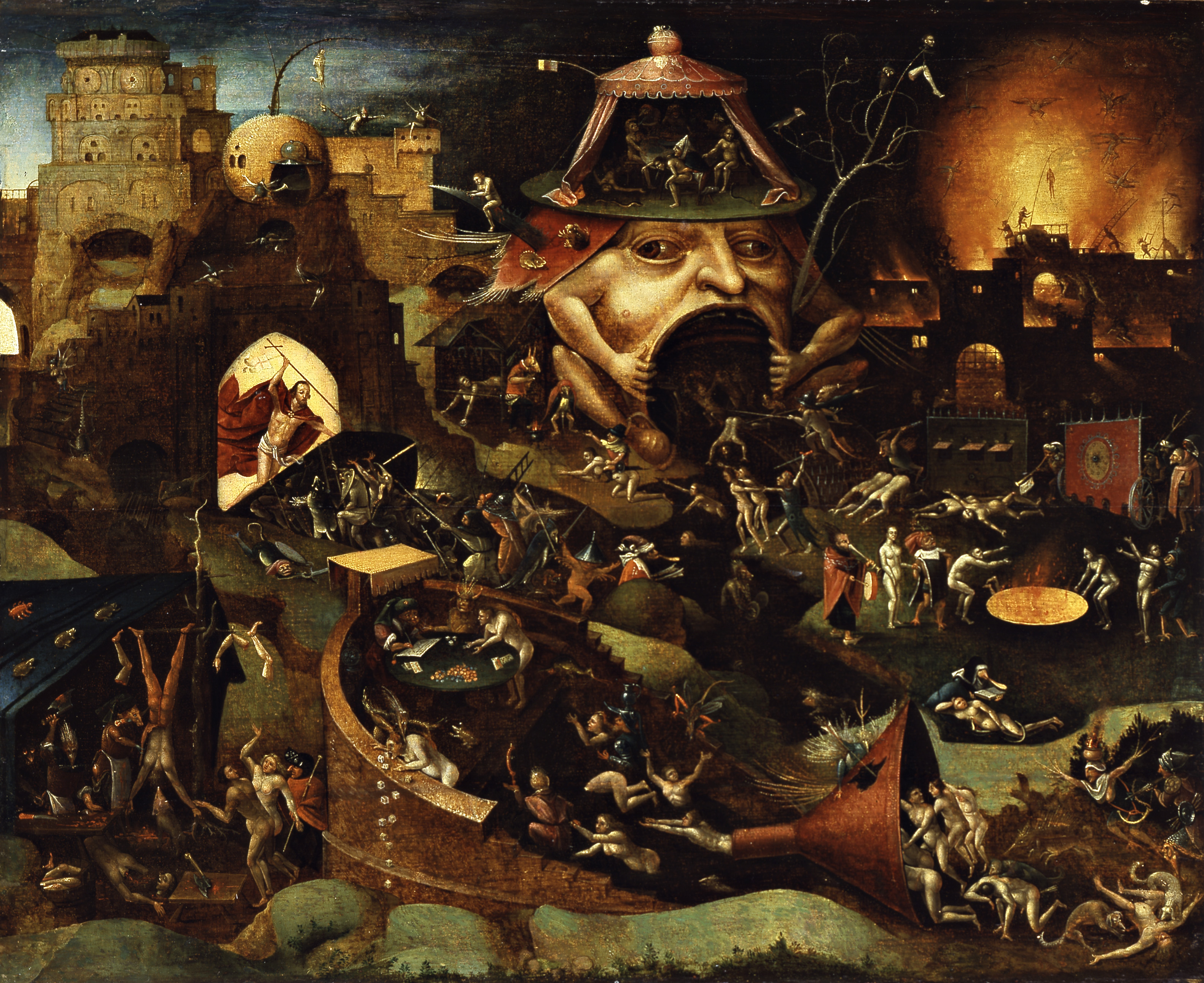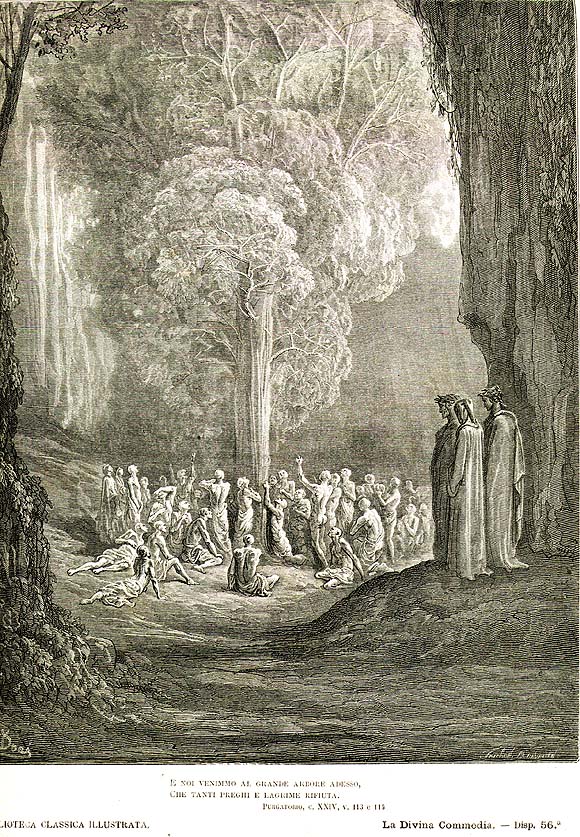|
Araf (Islam)
In Islam, al-A'raf ( ar, الأعراف) is a separator realm or borderland between Jannah (heaven) and Jahannam (hell), inhabited by those who are evenly balanced in their sins and virtues, they are not entirely evil nor are they entirely good. This place may be described as a kind of benevolent purgatory with privation but without suffering. The word is literally translated as "the heights" in English. The realm is described as a high curtain between hell and paradise. Ibn Kathir described A'raf as a wall that contains a gate. In this high wall lived people who witness the terror of hell and the beauty of paradise. They yearn to enter paradise, but their sins and virtues are evenly balanced. Yet with the mercy of God, they will be among the last people to enter the paradise. The Catholic scholar of Islam Louis Massignon believed the Christian concept of limbo was inspired by the Muslim interpretation of A'raf.Cyril Glassé, Huston Smith ''The New Encyclopedia of Islam'' Rowman ... [...More Info...] [...Related Items...] OR: [Wikipedia] [Google] [Baidu] |
Islam
Islam (; ar, ۘالِإسلَام, , ) is an Abrahamic monotheistic religion centred primarily around the Quran, a religious text considered by Muslims to be the direct word of God (or '' Allah'') as it was revealed to Muhammad, the main and final Islamic prophet.Peters, F. E. 2009. "Allāh." In , edited by J. L. Esposito. Oxford: Oxford University Press. . (See alsoquick reference) " e Muslims' understanding of Allāh is based...on the Qurʿān's public witness. Allāh is Unique, the Creator, Sovereign, and Judge of mankind. It is Allāh who directs the universe through his direct action on nature and who has guided human history through his prophets, Abraham, with whom he made his covenant, Moses/Moosa, Jesus/Eesa, and Muḥammad, through all of whom he founded his chosen communities, the 'Peoples of the Book.'" It is the world's second-largest religion behind Christianity, with its followers ranging between 1-1.8 billion globally, or around a quarter of the world's ... [...More Info...] [...Related Items...] OR: [Wikipedia] [Google] [Baidu] |
Jannah
In Islam, Jannah ( ar, جَنّة, janna, pl. ''jannāt'',lit. "paradise, garden", is the final abode of the righteous. According to one count, the word appears 147 times in the Quran. Belief in the afterlife is one of the six articles of faith in Sunni and Twelver Shi'ism, a place where " believers" (''Mumin'') will enjoy pleasure, while the unbelievers (''Kafir'') will suffer in '' Jahannam''. Thomassen, "Islamic Hell", Numen, 56, 2009: p.401 Both ''Jannah'' and '' Jahannam'' are believed to have several levels, in both cases, the higher the level, the more desirable -- in ''Jannah'' the higher the prestige and pleasure, in ''Jahannam'' the less the suffering. The afterlife experiences are described as physical, psychic and spiritual. Jannah is described with physical pleasures such as gardens, houris, wine that has no aftereffects, and "divine pleasure". Their reward of pleasure will vary according to the righteousness of the person. The characteristics of ''Jannah'' of ... [...More Info...] [...Related Items...] OR: [Wikipedia] [Google] [Baidu] |
Jahannam
In Islam, the place of punishment for unbelievers and other evildoers in the afterlife, or hell, is an "integral part of Islamic theology", Thomassen, "Islamic Hell", Numen, 56, 2009: p.401 and has "occupied an important place in the Muslim imagination". Lange, "Introducing Hell in Islamic Studies", 2016: p.3 It is often called by the proper name Jahannam., , but other names include "the fire" , ''al-nar'', "blazing fire" , ''jaheem'', "that which breaks to pieces" ''hutamah'', "the abyss" , ''haawiyah'', "the blaze" , ''sa’eer'', "place of burning" ''Saqar'', which are also often used as the names of different gates to hell. The importance of Hell in Islamic doctrine is that it is an essential element of the Day of Judgment, which is one of the six articles of faith (belief in God, angels, books, prophets, the Day of Resurrection and providence) "by which the Muslim faith is traditionally defined." Punishment and suffering in Hell, in mainstream Islam, is physical, psyc ... [...More Info...] [...Related Items...] OR: [Wikipedia] [Google] [Baidu] |
Purgatory
Purgatory (, borrowed into English via Anglo-Norman and Old French) is, according to the belief of some Christian denominations (mostly Catholic), an intermediate state after physical death for expiatory purification. The process of purgatory is the final purification of the elect, which is entirely different from the punishment of the damned. Tradition, by reference to certain texts of scripture, sees the process as involving a cleansing fire. Some forms of Western Christianity, particularly within Protestantism, deny its existence. Other strands of Western Christianity see purgatory as a place, perhaps filled with fire. Some concepts of Gehenna in Judaism resemble those of purgatory. The word "purgatory" has come to refer to a wide range of historical and modern conceptions of postmortem suffering short of everlasting damnation. English-speakers also use the word in a non-specific sense to mean any place or condition of suffering or torment, especially one that is tempo ... [...More Info...] [...Related Items...] OR: [Wikipedia] [Google] [Baidu] |
Ibn Kathir
Abū al-Fiḍā’ ‘Imād ad-Dīn Ismā‘īl ibn ‘Umar ibn Kathīr al-Qurashī al-Damishqī (Arabic: إسماعيل بن عمر بن كثير القرشي الدمشقي أبو الفداء عماد; – 1373), known as Ibn Kathīr (, was a highly influential Arab historian, exegete and scholar during the Mamluk era in Syria. An expert on ''tafsir'' (Quranic exegesis) and ''fiqh'' (jurisprudence), he wrote several books, including a fourteen-volume universal history titled Al-Bidaya wa'l-Nihaya. Ludwig W. Adamec (2009), ''Historical Dictionary of Islam'', p.138. Scarecrow Press. . His ''tafsir'' is recognized for its critical approach to '' Israʼiliyyat'', especially among Western Muslims and Wahhabi scholars. His methodology largely derives from his teacher Ibn Taymiyyah, and differs from that of other earlier renowned exegetes such as Tabari. For that reason, he is mostly considered an Athari, despite being a Shafi'i jurist. Biography His full name was () and had t ... [...More Info...] [...Related Items...] OR: [Wikipedia] [Google] [Baidu] |
Louis Massignon
Louis Massignon (25 July 1883 – 31 October 1962) was a Catholic scholar of Islam and a pioneer of Catholic-Muslim mutual understanding. He was an influential figure in the twentieth century with regard to the Catholic church's relationship with Islam. He focused increasingly on the work of Mahatma Gandhi, whom he considered a saint. He also played a role in Islam being accepted as an Abrahamic Faith among Catholics. Some scholars maintain that his research, esteem for Islam and Muslims, and cultivation of key students in Islamic studies largely prepared the way for the positive vision of Islam articulated in the Lumen gentium and the Nostra aetate at the Second Vatican Council. Although a Catholic himself, he tried to understand Islam from within and thus had a great influence on the way Islam was seen in the West; among other things, he paved the way for a greater openness inside the Catholic Church towards Islam as it was documented in the pastoral Vatican II declarati ... [...More Info...] [...Related Items...] OR: [Wikipedia] [Google] [Baidu] |
Limbo
In Catholic theology, Limbo (Latin '' limbus'', edge or boundary, referring to the edge of Hell) is the afterlife condition of those who die in original sin without being assigned to the Hell of the Damned. Medieval theologians of Western Europe described the underworld ("hell", "hades", "infernum") as divided into three distinct parts: Hell of the Damned,''Catholic Encyclopedia'': Hell "However, in the New Testament the term is used more frequently in preference to hades, as a name for the place of punishment of the damned. … held in abomination by the Jews, who, accordingly, used the name of this valley to designate the abode of the damned (Targ. Jon., Gen., iii, 24; Henoch, c. xxvi). And Christ adopt ... [...More Info...] [...Related Items...] OR: [Wikipedia] [Google] [Baidu] |
Purgatory
Purgatory (, borrowed into English via Anglo-Norman and Old French) is, according to the belief of some Christian denominations (mostly Catholic), an intermediate state after physical death for expiatory purification. The process of purgatory is the final purification of the elect, which is entirely different from the punishment of the damned. Tradition, by reference to certain texts of scripture, sees the process as involving a cleansing fire. Some forms of Western Christianity, particularly within Protestantism, deny its existence. Other strands of Western Christianity see purgatory as a place, perhaps filled with fire. Some concepts of Gehenna in Judaism resemble those of purgatory. The word "purgatory" has come to refer to a wide range of historical and modern conceptions of postmortem suffering short of everlasting damnation. English-speakers also use the word in a non-specific sense to mean any place or condition of suffering or torment, especially one that is tempo ... [...More Info...] [...Related Items...] OR: [Wikipedia] [Google] [Baidu] |
Gehenna
The Valley of Hinnom ( he, , lit=Valley of the son of Hinnom, translit=Gēʾ ḇen-Hīnnōm) is a historic valley surrounding Ancient Jerusalem from the west and southwest. The valley is also known by the name Gehinnom ( ''Gēʾ-Hīnnōm'', lit. 'Valley of Hinnom') an alternative Biblical Hebrew form which survived into Aramaic and has received various fundamental theological connotations, and by the Greek and Syriac transliteration Gehenna (Γέεννα ''Géenna''/ܓܼܼܗܲܢܵܐ ''Gihanna''). The Valley of Hinnom is first mentioned in the Hebrew Bible as part of the border between the tribes of Judah and Benjamin ( Joshua 15:8). During the late First Temple period, it was the site of the Tophet, where some of the kings of Judah had sacrificed their children by fire ( Jeremiah 7:31). Thereafter, it was cursed by the biblical prophet Jeremiah ( Jeremiah 19:2– 6). In later Jewish rabbinic literature, Gehinnom became associated with divine punishment in Jewish ... [...More Info...] [...Related Items...] OR: [Wikipedia] [Google] [Baidu] |
Barzakh
Barzakh (Arabic: برزخ, from Persian ''Barzakh'', "limbo, barrier, partition") is an Arabic word meaning "obstacle", "hindrance", "separation", or "barrier". In Islam, it denotes a place separating the living from the hereafter or a phase/"stage" between an individual's death and their resurrection in "the Hereafter". Some scholars believe that good Muslims will have a heavenly experience during this time, and sinners will experience suffering; while some Shia scholars believe the experience will not be like the physical pain or pleasure of the temporal world. Scholars have different definitions of ''Barzakh''. According to Ghazali, Barzakh may be the place for those who go neither to hell nor to heaven. According to Ibn Hazm, Barzakh is also the place for unborn souls, which are elsewhere described as residing in the lowest of the seven heavens, where an angel blows them into the wombs of women. Etymology The Arabic word ''Barzakh'' is derived from the Middle Persian ... [...More Info...] [...Related Items...] OR: [Wikipedia] [Google] [Baidu] |
Matarta
In Mandaean cosmology, a maṭarta ( myz, ࡌࡀࡈࡀࡓࡕࡀ; plural form: ''maṭarata'') is a "station" or "toll house" that is located between the World of Light (''alma ḏ-nhūra'') from Tibil (Earth). It has variously been translated as "watch-station", "toll-station", "way-station", or "purgatory". Maṭartas are guarded by various uthras (celestial beings from the World of Light) and demons. Ruha, the queen of the underworld, is the ruler or guardian of the third maṭarta. To reach the World of Light (''alma ḏ-nhūra'') from Tibil (Earth), souls must pass through the various maṭartas that are situated in between. Rituals such as the ''masiqta'' can help guide souls past the various maṭarta so that they could reach the World of Light. In the Ginza Rabba In the Ginza Rabba, Chapter 3 in Book 5 of the ''Right Ginza'', Book 6 of the ''Right Ginza'' (also known as the "Book of Dinanukht"), and Chapter 4 in Book 1 of the ''Left Ginza'' give detailed descriptions of ... [...More Info...] [...Related Items...] OR: [Wikipedia] [Google] [Baidu] |
.jpg)






.jpg)
